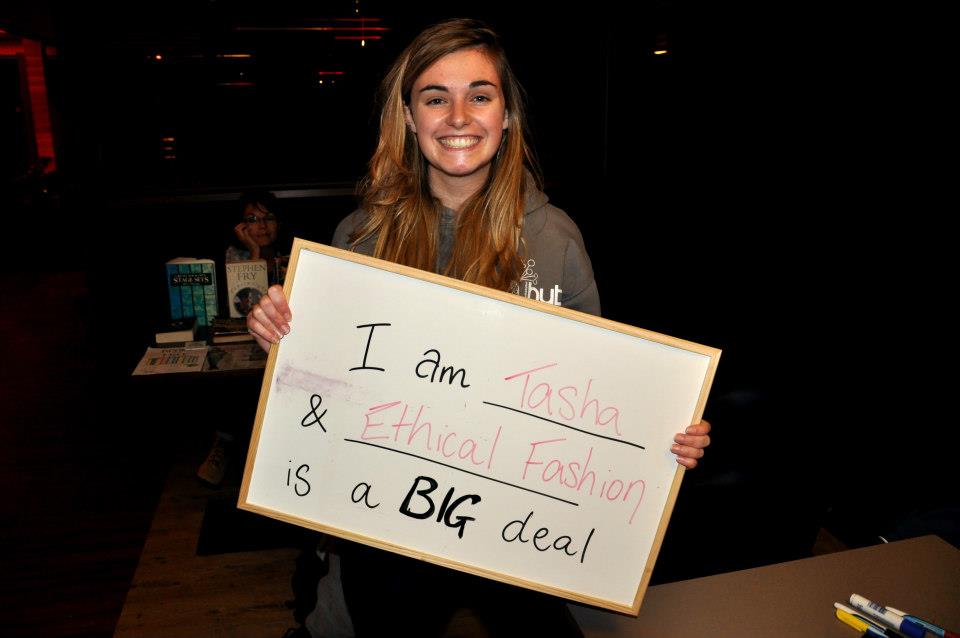A couple of years ago I challenged myself to avoid shopping on the high street for a whole year; a fast fashion fast if you will. Why? Well, this thing I loved so much seemed to rely, almost inevitably, on exploiting people, on damaging the planet, and on manipulating the very people who buy in to it. So I thought I would extricate myself from the whole thing for a while, read up on it and experiment with ‘ethical fashion’ a little.
Full disclosure: it wasn’t entirely successful – where does a girl find jeans that are ethical, affordable and actually fit her actual body? Even so, it has had a lasting impact on my consumption habits (along with my almost Nestle boycott, my inconsistent dabbling in vegetarianism, my yearly sort-of-resolve to buy all my Christmas presents from ethical and independent shops…you get the picture).
I did largely manage it though, and I certainly reduced my consumption a lot as a result. Along the way, I found a whole raft of interesting places to find clothes that have been responsibly made and got much better at buying second hand. It was also a really good talking point with my friends.
And now? I have gone back to shopping on the high street, but I can probably count on my fingers the number of ‘fast fashion’ items I’ve bought in the last year. I also tend to buy better quality when I do, rather than lots of cheap things.
My body image has improved no end since I stepped out of the fashion cycle (high street shops are scary once you’ve been away a while) and that determines which shops I actually go to now. I also found that charity shops and vintage shops are definitely good places for a scavenge (no self-respecting sustainable fashion blog would forget to mention these) but they do take practise – it took me ages to actually find decent stuff in them.
The biggest change though, is that I actually plan what I buy. It’s on a real need basis – i.e. my jeans split or I need something smarter for work, and I go out with an intention to buy that one thing, as ethically as I can. Often it takes me ages to find it, because if I’m letting myself buy something it’s a treat and I resent the thought of buying something that isn’t exactly what I want. Case in point, it took me over a year to find a pair of black ankle boots (!!) and now they’re falling apart but I’m determined to get them fixed so they last.
So, what are my thoughts on the industry as a result? There are a tonne of places where you can find interesting debates on the various issues – they rage on precisely because there isn’t currently a right (attractive?) answer.
Yes we could all go back to the 50s and own one nice dress; but, consumption patterns aside and to briefly reduce a complicated argument to its basics, what about the people that have a chance of lifting themselves out of poverty by supplying the fashion industry? Plus, when you wander into a shop and see the items it’s really hard to envision where they came from: the corners of the world the component parts have travelled and the hands they will have crossed through before you pick it up off the rail – so change is always going to be hard.
Even so, I hope that we could still love fashion, still look good and still ‘express ourselves’ through clothes, and I hope that people could still make a living from the clothes we wear.
However, I don’t trust the high street fashion industry to solve this. They make big profit from fashion so they’re hardly going to make the radical shift we actually need. As consumers, we need to adjust our thinking – for the raw materials to be sourced responsibly, all those involved paid fairly and the environmental impact of production reduced, we can’t buy things for high street prices. And we’re not ‘entitled’ to cheap fashion anyway.
Vivien Westwood said fast fashion has made us all look the same – precisely because we follow seasonal trends instead of finding stuff that actually suits us as individuals, is well made and looks good. More responsible fashion challenges this – items tend to be better made and producers don’t follow seasonal trends (they just can’t) so clothes don’t date so quickly. Plus if you’re buying vintage – well, clothes were made to last back in the day.
My main takeaway though, was that we just don’t need to buy so much: no-one needs a ‘new summer wardrobe’, and, until we accept this, everything else is greenwash.
This December, Student Hubs is running the Ethical Advent campaign. Each day on our Facebook and Twitter channels we’ll bring you a different ethical clothes or gift site that you can peruse for presents. We can’t deny that this season is increasingly driven by consumerism; so let’s try and minimise the damage.

